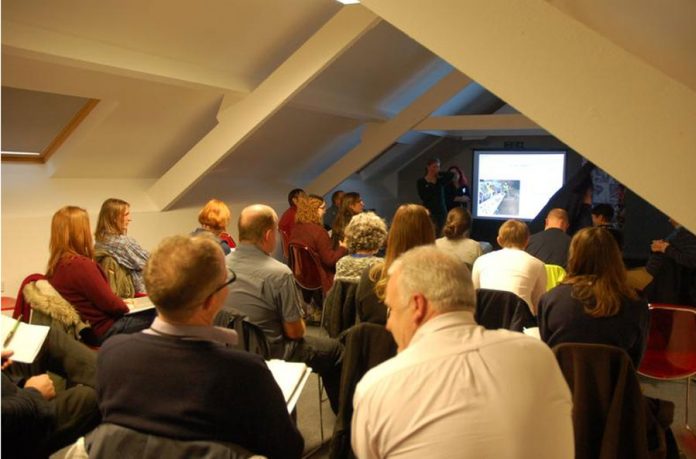The snow failed to dampen spirits – or reduce the attendance – at the Wessex Sheffield office’s
seminar last week. (BAJR in attendance as well)
A fascinating presentation by
Dr Paul Baggaley about the use of UAVs (or ‘drones’) in archaeological survey. With standard and near Infra-Red cameras, and a lot of know-how, Paul’s team can produce digital images of whole landscapes from a single day’s survey.
Then Jackie McKinley took over to talk about cremation burials. She described how the specialist excavation of these graves can reveal so much about the process of cremation and the way that people were buried. With radiocarbon analysis of cremated bone now possible, the dates of these burials and the grave goods can be refined considerably.
After a break
Dr Alistair Barclay gave a presentation on radiocarbon dating and Bayesian modelling. Over the last couple of decades, the precision of radiocarbon analysis and the use of Bayesian analysis combine to be able to give us dates to within 100 years, or less in many cases. It is real progress that, even in prehistory, we can begin to understand the duration of settlements in terms of generations. By the end of the session, several people (including Wessex staff) were heard muttering ‘
I think I understand Bayesian modelling now…’
Sarah Wyles then led a short but informative discussion about environmental sampling. She described how the inclusion of multiple, small, soil samples in our sampling strategies allow her to look at past environments in much more detail.
During an excellent lunch – supplied by Carol’s Catering Service who deserve a special mention for making it through the snow – there were displays and information posters about a range of projects.
The afternoon session began with a talk by Laura Joyner about Wessex Archaeology’s Outreach and Education projects. Laura’s presentation included Operation Nightingale and Project Florence, in which heritage and community archaeology were part of a military recovery initiative for injured soldiers. There was great interest in this aspect of Wessex’s work which the audience described as ‘inspiring’.
Lorraine Mepham closed the day with a discussion about archiving the results of our excavations and surveys. With Wessex carrying out projects across England, Scotland and Wales, meeting the requirements of so many different museums is no mean feat. Museum storage space is limited and the main challenges for the future will be dealing with digital data and considering the need to select the material that we store.
The aim was to offer informative presentations to fellow heritage professionals and to promote Wessex’s charitable status and outreach projects. We hope that the participants were inspired to consider partnering with Wessex to deliver outreach and education projects across the north.
The feedback from the event was very positive. So much so that Wessex are considering running a similar event next year – watch this space.
BAJR note. I can say from my own experience, that the Seminar was enlightening and allowed for far reaching debate about issues within various sectors of archaeology – as well as allowing me to understand Bayesian Statistics at last!. I learned lots and would travel to similar events. perhaps something to think about for us all. As Andrea says… “Let’s Work Together”
Andrea Burgess – Post Excavation manager


